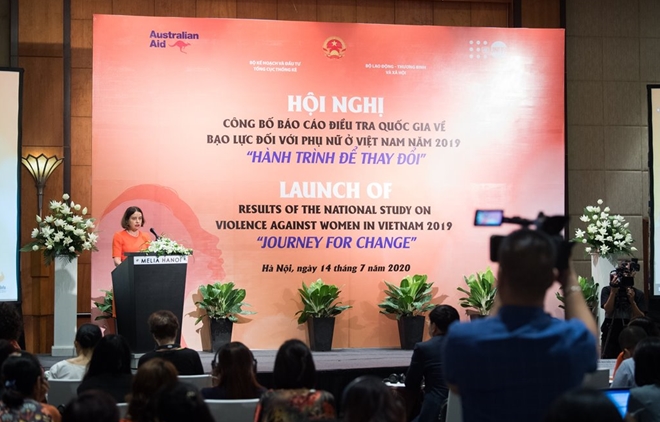Second national study on violence against women in Vietnam 2019 released
 |
| An overview of the event. |
The study, whose results were launched today, shows that nearly two in three married women (almost 63 per cent) have experienced one or more forms of physical, sexual, emotional and economic violence and controlling behaviours by their husbands in their lifetime, and almost 32 per cent in the last 12 months.
Viet Nam is the only country in the world so far which has conducted a second dedicated study specifically using cross-culturally validated methodology developed by the World Health Organization.This study was managed by the Ministry of Labour, Invalids and Social Affairs – MOLISA, in collaboration with the General Statistics Office, with technical and financial support from UNFPA and Australia’s Department of Foreign Affairs and Trade (DFAT). This study enables a better understanding of what has changed since the first study in 2010, as well as what has not, and what needs to be in place for strengthening gender equality and ending gender-based violence in Viet Nam.
The 2019 study has three parts: a quantitative survey, conducted by the General Statistics Office; a qualitative study by the Center for Creative Initiatives in Health and Population - CCIHP; and an economic costing of violence by international experts commissioned by UNFPA.
Nearly 6,000 women aged 15 to 64 were interviewed, with the results showing that in Vietnam most of the violence against women is perpetrated by their husbands or partners.
The study also shows that with the exception of sexual violence, the prevalence of different types of violence against women, perpetrated by husbands, was slightly lower in 2019 than in 2010, and positive change may be happening among younger women.In addition, the report estimated that violence against women cost Vietnam an estimated 1.8 per cent of its Gross Domestic Product (GDP) in 2018.
“After nearly ten years since the first survey, the results show both positive changes and shortcomings. Overall, the percentage of women suffering from these forms of violence has decreased slightly. Positive change is clearly seen among young women who did not endure and showed their strength in fighting against violence. Women who have higher education are less likely to experience violence. This shows that education is very important in helping women to be stronger, more confident and independent in life. However, many women are still vulnerable to violence. Violence against women remains hidden because gender stereotypes are still common in society. Silence, stigma from the community and a culture of blame are barriers that prevent the survivors from speaking out and seeking help. Children are also victims, more vulnerable to violence, especially when they witness domestic violence against their mothers,” explained Nguyen Thi Ha, Vice Minister, MOLISA/ Standing Vice Chairman of the National Committee for the Advancement of Women in Vietnam.
“These shortcomings and challenges need to be thoroughly addressed by the government agencies as well as the socio-political organizations, non-governmental organizations and each citizen in society,” she added.
“Ending violence against women and girls is one of the three transformative results that UNFPA has pledged to achieve worldwide,” noted Naomi Kitahara, UNFPA Representative in Viet Nam. “In Vietnam, UNFPA has worked alongside the Government and stakeholders for more than a decade towards ending violence against women. Today, we have even more evidence to spur us to even greater action, and I call on everyone to join forces to eliminate this violence. Without addressing this, Vietnam quite simply cannot achieve the 2030 Sustainable Development Agenda and its Sustainable Development Goals, and ensure no one is left behind.”
“Australia is deeply committed to ending gender-based violence,” said Robyn Mudie, Australian Ambassador to Vietnam. “We have supported this study because it leads us all to acknowledge just how many lives are affected by violence, coercive control and harassment. Each piece of data in this report represents the experience of a Vietnamese woman or girl, whether in their home, at work or in a public place. This report means that we hear them, we believe them, and we need to act.”
